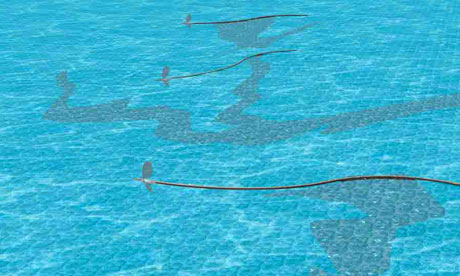Celine Gehret has been asked to pose for photographs many times but never while wearing a pink colander for a hat and a plastic shopping bag for a face mask. But Gehret, one of Cornwall’s most outstanding surfers, is anxious to make a point.
 .
.
The campaign group Surfers Against Sewage (SAS) claims that Britain’s beaches are being damaged by the “growing problem” of marine litter and the discharge of effluent into the ocean.
An unusually warm April has already led to packed beaches but to coincide with the official start of the bathing season next month, SAS will launch a new warning system whereby beach users - from families with buckets and spades to professional surfers and body-boarders - will be able to receive real time sewage alerts that will warn them that the water they are intending to swim in is unclean.
The alerts will be sent by text and tweet and will cover up to 50 of Britain’s best beaches. The warning system is being set up in conjunction with three of Britain’s biggest water companies, South-West, Southern and Welsh. The alerts are part of a wider surfing campaign called “Protect Our Waves” and will be accompanied by an arresting poster campaign featuring some of Britain’s star surfers.
In the most shocking image of a campaign produced by the advertising agency M&C Saatchi, which includes the Conservative Party, Coca-Cola and the Department of Health among its client roster, the champion British body-boarder Jack Johns is pictured covered head-to-toe in what appears to be excrement (it is in fact brown coloured polystyrene). Johns, 24, who began surfing in his native Cornwall at the age of 16 and is the current world belly-boarding champion, said Cornish waters were generally clean but he had encountered severe problems off the east coast of England. “I have been surfing in Yorkshire among raw sewage and it’s horrific – you don’t realise until it is right in front of you,” he said. “There are amazing waves in Yorkshire when the conditions are right but raw sewage is being pumped into the North Sea so often and there’s nothing stopping it.”
Gehret, 30, who is shown entirely shrouded in marine refuse, is a four times Swiss champion surfer who is based at Fistral beach in north Cornwall. She recalled once trying to surf at Whistand Bay in south Cornwall and finding that the water was brown. “We didn’t go in because it didn’t seem safe. The waves were good but you couldn’t surf.” Hugo Tagholm, director of SAS, said: “I have suffered from stomach bugs and throat infections. If you visit any beach in the UK there will be marine litter and there has been a 120 per cent increase since 1994.”
Among the beaches being covered by the new warning system are Bude, Porthleven and Porthtowan in Cornwall, Brighton and the Welsh beaches of Newgale and Broadhaven. “These real time alerts are about giving people reassurance. If pollution incidents are being reported in real time then people using bathing spots can have confidence in whether or not the water they are using is clean.”
SAS hopes that Yorkshire Water will join the alert system next year and that the remainder of Britain’s water companies will eventually sign up to the scheme. The images of champion surfers covered in sewage and detritus will be shown in magazines and on strategic billboard sites, such as alongside the River Thames, which conveys large amounts of marine litter into the ocean. Graham Fink, executive creative director of M&C Saatchi, said: “Most people think of the seaside as quintessentially British with fresh air, sea and sand. But it’s not all what it seems. Lurking under the surface are hidden horrors. We wanted to smack people in the face with a wet fish and show the problem in an arresting way.”

